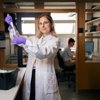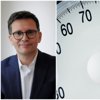Fritextsökning
Artiklar per år
Innehållstyper
-

Cancer researcher: “We can do better and reduce suffering”
Lund University researcher Catharina Hagerling is developing innovative methods to understand metastatic cancer, aiming to create more targeted treatments for patients with disseminated cancer.
-

Investors portföljbolag köper diagnostikföretag – för 22 miljarder kronor
Advanced Instruments har ingått ett bindande avtal om att förvärva Nova Biomedical för 2,2 miljarder dollar, motsvarande cirka 22 miljarder kronor.
-

Career coach on salaries: “There is no right or wrong”
What is a reasonable salary for my job? It's a question we all ask ourselves. But how important is a higher salary really? Career coach Tina Persson believes this is an important consideration.
-

EMA varnar för icke godkända cellterapier
Icke godkända, och därmed olagliga, avancerade terapiläkemedel marknadsförs till patienter i Europa. Det uppger den europeiska läkemedelsmyndigheten EMA, som nu går ut med en varning till allmänheten.
-

Security flaw in Swedish breast cancer screening software – woman passed away
A lack of safeguard in Sectra's software led to a woman with breast cancer receiving an incorrect diagnosis. She later passed away. The software is used in 20 out of 21 regions in Sweden. It is also used in neighbouring Nordic countries. “Extremely serious,” says the Sectra CEO to Medtech Magazine.
-

Investment CEO: “The Nordics are outstanding in creating successful medtech companies”
Since the beginning of last month, Susanna Francke Rodau has been a partner and the new CEO of Segulah Medical Acceleration, which invests in medical technology. In an interview she tells about which companies the investment company prefers to invest in, which companies she believes in the most in the portfolio and why she accepted the new position.
-

Björn Arvidsson: ”We must raise our gaze to find the answers of the future”
A system approach isn't just about understanding complexity – it's about making better decisions. By seeing ourselves as part of larger systems, we can better anticipate the consequences of our actions, writes Björn Arvidsson in a column.
-

First preterm infants study – a vital step for Neola
After years of developing an advanced lung monitoring system, Neola Medical has received some delightful news: permission to start its first clinical study on preterm born infants.
-

Grönt ljus för Kennedy sänker läkemedelsbolag
Flera läkemedelsbolag backar på börsen efter att senatskommittén godkänt Robert F. Kennedy Jr som kandidat till landets hälsominister.
-

Life science trends 2025 – Neurology
New Alzheimer's drugs are beginning to be used in Sweden, more deals in the neuro sector are expected, and tools for deliver active substances across the blood-brain barrier are being developed. In addition, a new type of drug for MS is making its debut. This part of trend insights on life science 2025 is about neurology.
-

We desire talent to come here, but are we genuinely welcoming them?
Sweden faces significant challenges in creating a truly inclusive environment that makes international professionals feel welcome, valued, and able to build meaningful careers, writes Sarah Lidé in a column.
-

She is CSL Behring's new Nordic General Manager
Since the beginning of january, Helena Bragd is the new Nordic General Manager for the biotech company CSL Behring and CEO of CSL Behring AB.
-

16 miljoner kronor till ATMP i Västsverige
Genom en miljonsatsning i Västra Götalandsregionen ska små och medelstora life sciene-bolag få stöd för att accelerera utvecklingen inom avancerade terapiläkemedel (ATMP).
-

Life science trends 2025 – Part 1 obesity drugs
More obesity drugs are being launched this year following Novo Nordisk and Eli Lilly's previous successes with GLP-1 drugs. But the next big breakthrough in obesity has a different mechanism of action, writes Samuel Lagercrantz in the first article in a series of trend insights for 2025. Today: obesity.
-

New cell therapy raises hope for curing type 1 diabetes – "Never succeeded before"
For the first time, a patient with type 1 diabetes has undergone an islet transplantation using genetically modified insulin-producing cells that do not require immunosuppressive drugs. "A major immunological breakthrough," says Professor Per-Ola Carlsson, who leads the clinical study, to Life Science Sweden.